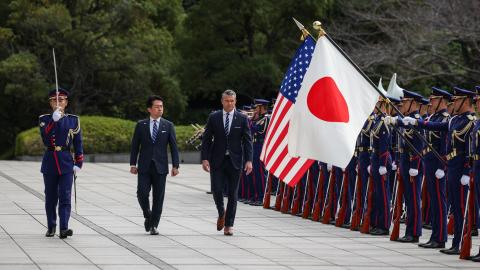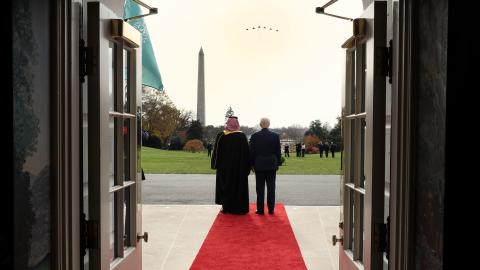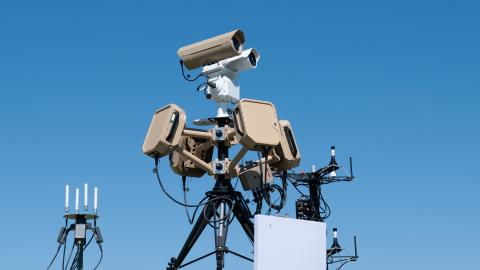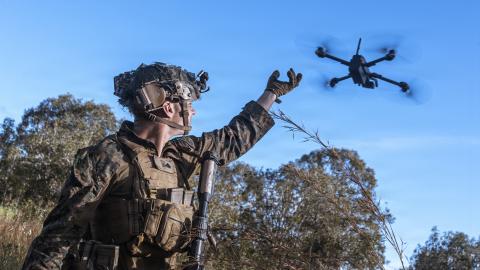Jerusalem—Here in Israel the reckoning has been underway at least since the U.N.-brokered ceasefire started Monday morning. The papers are loaded with detailed analysis of varying opinion, but much of the criticism of the military and political leadership has nothing to do with how they waged war against Hezbollah. Among other scandals brewing, it has been reported that IDF Chief of Staff Dan Halutz sold nearly $26,000 worth of stock right after the kidnapping of the two soldiers that sparked the conflict, and Prime Minister Ehud Olmert seems to have gotten a sweetheart deal on a luxury Jerusalem apartment last year.
My Lebanese friends are curious to know if all this means that Israel is tearing itself apart at the seams. They know better, but the man who is de facto leader of their country, Hassan Nasrallah, believes that a free press and dissent are signs of weakness.
Of course, it is very dangerous in Lebanon to disagree with Nasrallah, which might be why future MP Saad Hariri, son of the slain ex-Prime Minister Rafiq al-Hariri, says he is so proud of Lebanon's "victory," which he credits to the arms of the resistance. Perhaps Saad means to preserve Lebanon's illusory "national unity," a fiction that may only serve to make it easier for IDF planners during the next round of fighting, which many believe to be inevitable.
Unlike other Western observers, most Israelis don't seem particularly concerned that the Arabs consider this a great victory for Hezbollah. The fact is no one can really afford to tabulate wars the way the Arabs do, not those who make war against them nor, least of all, the Arabs themselves, who acknowledge defeat only after losing lives and land on a massive scale.
The June 1967 war is the gold standard for defeat in the Arab world, but the intra-Arab slaughter at Hama in Syria and the failed Palestinian uprising in Jordan, known as the Black September, are also understood as defeats. In Lebanon, however, where the only parts of the country that were destroyed were those ostensibly "defended" by the resistance, and tens of thousands of civilians avoided death only because the enemy warned them to leave, the Arabs believe they have achieved an historic victory. "If Nasrallah sent a missile through my window," as one young Israeli Arab told me, "I would be happy just knowing that Arabs were fighting."
Even though Nasrallah's rockets killed lots of Israelis, and many Arabs among them, I have yet to meet an Israeli who is scared or even nervous. Still, most here believe that they are always walking a very fine line with little room for error, and what mistakes that have been made need to be corrected quickly.
In contrast, the Bush administration is now behaving more like an Arab regime, as though no one will ever have to pay the price for endangering the lives of people the administration is supposed to protect. Why Secretary of State Rice spent so much time and prestige working on U.N. Resolution 1701 is baffling. Presumably, it was to garner support for America's own fight with the Iranians; if that's so, the White House should learn from its mistakes here and correct them before crunch time. If Washington was more like Jerusalem, Rice would probably be looking for another job right now. Her ceasefire is on the verge of falling apart after less than a week for reasons that were obvious from the outset.
First, the Lebanese government has said in the past that it could not disarm Hezbollah. Furthermore, in the two years since UNSCR 1559, it has demonstrated no will to do so. Second, no matter what the rules of engagement are for a reinvigorated UNIFIL, no European leader is foolish enough to commit troops if it means standing between an armed Hezbollah and a state whose very existence is threatened by an armed Hezbollah.
And so, if what we have seen the last month is at least in part a proxy war between the United States and Iran, we now have an idea of what a real war between these two states would look like, as almost everyone at the table has shown his hand:
The conservative Arab regimes, Egypt, Jordan and the Gulf States, will keep their mouths shut as long as they can, desperately needing an American victory. They will be under intense pressure from "the street," which supports Tehran's agenda and the Damascus-Hezbollah-Hamas axis, but between two hard choices the regimes really have none but to tough it out. Most importantly, Saudi Arabia will keep pumping oil.
Maybe Europe really is "with" the United States regarding the Iranian nuclear program, whatever that may mean at this point. It agrees that Iran is a serious problem, but given the political climate in England, France, and Germany, siding with the United States will be a serious problem, and unlike their Arab counterparts, European leaders can actually lose their jobs. It's worth remembering that France was to lead the pumped-up UNIFIL force with a reported 3,500 troops and has now backed out of its commitments almost entirely—an indication of Europe's aversion to any military action in the Middle East.
More to the point, it now seems clear that the Iranians have no interest in negotiating over their nuclear program. If, in this equation, Israel equals the United States and Hezbollah equals Iran, Hezbollah's refusal to disarm can be understood as Iran's refusal to give up its nuclear program. There is nothing subtle about Hezbollah's brinksmanship, they have effectively taken over the government of Lebanon and they threaten anyone who stands in the way of the resistance. Rather than disarm, they will instead conceal their arms in the south, as though prior to the recent conflict they were public about the number and location of the Chinese-made silkworm missiles they possessed. When the world community, led by the United States, has shown that it can snatch victory from the jaws of defeat on behalf of Hezbollah, why would the party of God's Iranian patron expect anything but the same deference?
That means that after putting a leash on its one truly useful ally in this war, the United States is virtually alone. So now the only real question mark, the only actor whose actions are not entirely predictable at this point, is the United States. We hope.
















